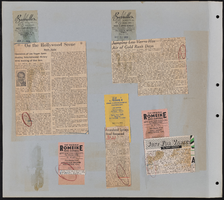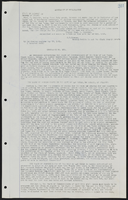Search the Special Collections and Archives Portal
Search Results

Harold McKay interview, March 13, 1981: transcript
Date
Archival Collection
Description
On March 13, 1981, Dana Jamerson interviewed Harold McKay (b. July 27th, 1903 in Dresden, Kansas) about his life as a teacher in Las Vegas, Nevada. McKay speaks about his education, his move from Chicago, Illinois to Las Vegas and how he began his career in education. McKay focuses on how and why he founded the Teacher’s Credit Union, his time working in administration and his business school, as well as the problems related to segregation and integration in the educational system. Lastly, he talks about the growth of the gaming and entertainment industry in Las Vegas, and his volunteer work with the Senior Citizen Center.
Text

Transcript of interview with Richard "Curley" Francis by Connie Degernes, March 4, 1975
Date
Archival Collection
Description
On March 4, 1975, collector Connie Degernes interviewed truck driver and rigger, Richard L. (Curley) Francis (born on July 27, 1907 in Compton, California) in his home in Boulder City, Nevada. The main focus of this interview is the construction of the Hoover Dam. Mr. Francis discusses the various occupations he has held since relocating to Nevada, including, Cat Skinner, truck driver, cableway operator, rigger foreman, and crane operator. He also talks about working for the government and the Six Company in Las Vegas.
Text

Transcript of interview with Sydney Wickliffe by Claytee White, February 1, 2013
Date
Archival Collection
Description
Sydney Wickliffe, nee Botkin, was born in Long Beach, California in 1944. Her parents, Donald and Betty Botkin, moved their young family first to Denver and then to the small town of Ulysses, Kansas before heading for Las Vegas in 1952, when Sydney was eight years old. Since then, she has called Las Vegas her home, graduating from Rancho High School's inaugural senior class in 1962. Growing up in a growing city, Sydney combined an active youth with long hours working in her father's North Las Vegas pharmacy and, later, would earn her degree in accounting from UNLV. As a CPA, she worked as an auditor for the Gaming Control Board and, in 1987, was promoted to deputy chief. From there, she took on the challenging role of director in Nevada's Department of Business and Industry as a member of Governor Kenny Guinn cabinet. As she says, even "one of the north-town girls" can go a long way - and in this interview, she shares memories that help us all see what the Las Vegas she remembers was like in the 1950s and 60s and how it helped to shape the person she is today.
Text

Transcript of interview with Michael S. Mack by Claytee White, May 21, 2009
Date
Archival Collection
Description
During this interview, Michael Mack visualizes his childhood memories of the later 1930s, when Las Vegas was a small, but steadily growing, desert town. As he says, "The desert was our backyard." The Strip hotels like the last Frontier and the Flamingo pop into the stories, but it was basically an innocent time. He attended John S. Park Elementary when classrooms were temporary buildings from the local Air Force base and the neighborhood was filled with children. He still maintains close friendships from that time. And he also recalls friends from the Westside neighborhood. Michael talks of scouting, riding horses, and watching Helldorado parades.
Michael Mack's first recollection of Las Vegas is as a two-year-old living in a duplex on Bonneville Ave. Though the family moved several times, they remained in or near the John S. Park neighborhood. Michael's father was a Polish immigrant who arrived in Boulder City, where he opened a shoe store, in 1932. The building of the Hoover Dam brought opportunities and his father Louis expanded into the salvage business. In time Louis moved the family to Las Vegas, opened a retail clothing store, which eventually sold uniforms, and set up the first local bail bondman office. During this interview, Michael visualizes his childhood memories of the later 1930s, when Las Vegas was a small, but steadily growing, desert town. As he says, "The desert was our backyard." The Strip hotels like the last Frontier and the Flamingo pop into the stories, but it was basically an innocent time. He attended John S. Park Elementary when classrooms were temporary buildings from the local Air Force base and the neighborhood was filled with children. He still maintains close friendships from that time. And he also recalls friends from the Westside neighborhood. Michael talks of scouting, riding horses, and watching Helldorado parades. Though the Macks were a Jewish family, Michael's mother always brought the Christmas tree to school. It was a period when people memorized each other's 3-digit phone numbers, went to movies for 14 cents, and there was a ranch for people to stay while getting divorced. Halloween Trick-or-treaters in the John S. Park neighborhood might get a tasty cupcake or a shiny dime. Michael has a plethora of stories about innocent mischief and the unique experiences of a boy growing up in Las Vegas.
Text

Transcript of interview with Joe Burton by Bob Barrera, March 11, 1980
Date
Archival Collection
Description
Text
Las Vegas African American Community Conversations round table interviews
Identifier
Abstract
The Las Vegas African American Community Conversations is a four-part conversation with local Las Vegans. The first part of the round table is moderated by Trisha Geran with a central theme of "Migration, Work and Community Emergence." The panelists discuss the early history of the African American community in Las Vegas, Nevada. They also discuss how and why their families moved to Las Vegas, most citing the economic opportunities as a major factor. The participants share their personal histories and family histories building up the African American community in downtown Las Vegas and the Westside. The second part of the round table is moderated by Sonya Horsford with a central theme of "Education, Economy, and Integration." The panelists discuss the Clark County School District pre- and post-integration. They discuss the hardships of the Sixth Grade Center Integration Plan on the African American community as well as discussing the differences in the school facilities. The round table participants also discuss the social services and social programs and the history of those programs from the African American perspective. They also discuss civic involvement and the various civic groups started by the panelists, and share discrimination they faced.
The third part of the round table is moderated by Claytee D. White with a central theme of "Civil Rights and Entertainment." The panelists discuss the racism and segregation present in Las Vegas and discuss how African American community leaders worked to integrate African Americans into the Las Vegas community. They discuss the 1969 riots in detail, and discuss African American entertainers and the entertainment industry. They share personal experiences working in the entertainment industry and discuss the importance of the local unions, such as the Culinary Workers Union Local 226, the International Alliance of Theatrical Stage Employees Local 720, and their contributions to the unions. The fourth and final part of the round table is moderated by Rachel Anderson with a central theme of the "Early African American Legal Community." The panelists discuss the foundations of the professional legal community in Las Vegas, noting the contributions of Charles Keller, Dr. William Bailey, and the Reverend Marion Bennett as driving forces for civil rights activism in Las Vegas. They share their experiences growing up in Las Vegas facing discrimination and segregation. Lastly, they share the changes they have seen and how both the legal and African African communities have grown.
Archival Collection

Transcript of interview with Joel Bergman by Stefani Evans and Claytee D. White, August 03, 2016
Date
Archival Collection
Description
Born in 1936, architect Joel Bergman spent his childhood in Venice, California, the son of Edythe Klein and Harry Bergman, a baker who later turned to dealing in scrap metal. The award-winning designer of such Las Vegas projects as the International Hotel, the MGM Grand Hotel (later Bally's), additions to the Riviera Hotel and the Golden Nugget downtown, the Mirage, Treasure Island, Paris Casino Resort, Caesars Palace, Trump International Hotel and Tower, the Signature at MGM Grand, Rhumbar, Gilley's at Treasure Island, and the Tropicana Hotel and Casino first arrived in Las Vegas in 1968 to work on the International Hotel. In this interview, Bergman discusses his architectural career, which began with his graduation in architecture from the University of Southern California; he also discusses his work with Martin Stern, his sixteen years with Steve Wynn, and the formation of his own architectural firm, Bergman Walls and Associates. Throughout, he pays tribute to the three mentors who had the greatest influence on his work—USC architecture professor Carleton Winslow, architect Berton Severson, and client Steve Wynn—and the ways they visualized people moving through space. He acknowledges other professionals whose work he admired and talks about his wives Marlene Federman, Terrie Colston, Maria Nicolini, and Valentina Bogdanova as well as his children and stepchildren. Joel David Bergman passed away August 24, 2016, three weeks after he gave this interview.
Text

Transcript of interview with Theda Kay Grinnell by Fletcher Corey, February 28, 1977
Date
Archival Collection
Description
On February 28, 1977, Fletcher Corey interviewed Theda Kay Grinnell (born 1935 in New London, Iowa) about her life in Las Vegas, Nevada. Grinnell first talks about her move to Nevada and both her and her husband’s work at the Nevada Test Site. She also talks about the atomic blasts, competition with Russia, and her employment that followed her work at the Test Site. Grinnell later talks about her church membership and goes into detail about the race riots and how they involved and impacted her and her son. The end of the interview includes discussion on flash floods, the culinary union, how World War II affected the Las Vegas industry, and the social changes in Las Vegas.
Text


